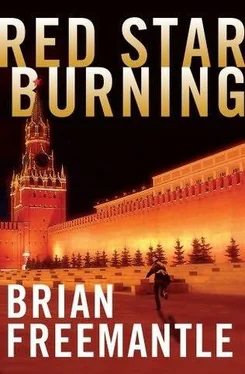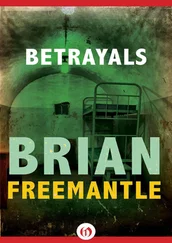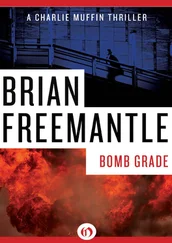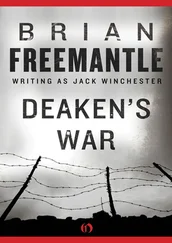Brian Freemantle - Red Star Burning
Здесь есть возможность читать онлайн «Brian Freemantle - Red Star Burning» весь текст электронной книги совершенно бесплатно (целиком полную версию без сокращений). В некоторых случаях можно слушать аудио, скачать через торрент в формате fb2 и присутствует краткое содержание. Жанр: Шпионский детектив, на английском языке. Описание произведения, (предисловие) а так же отзывы посетителей доступны на портале библиотеки ЛибКат.
- Название:Red Star Burning
- Автор:
- Жанр:
- Год:неизвестен
- ISBN:нет данных
- Рейтинг книги:3 / 5. Голосов: 1
-
Избранное:Добавить в избранное
- Отзывы:
-
Ваша оценка:
- 60
- 1
- 2
- 3
- 4
- 5
Red Star Burning: краткое содержание, описание и аннотация
Предлагаем к чтению аннотацию, описание, краткое содержание или предисловие (зависит от того, что написал сам автор книги «Red Star Burning»). Если вы не нашли необходимую информацию о книге — напишите в комментариях, мы постараемся отыскать её.
Red Star Burning — читать онлайн бесплатно полную книгу (весь текст) целиком
Ниже представлен текст книги, разбитый по страницам. Система сохранения места последней прочитанной страницы, позволяет с удобством читать онлайн бесплатно книгу «Red Star Burning», без необходимости каждый раз заново искать на чём Вы остановились. Поставьте закладку, и сможете в любой момент перейти на страницу, на которой закончили чтение.
Интервал:
Закладка:
The small conference room adjoining the Director-General’s office suite was totally silent, everyone waiting for someone else to risk the first contribution.
Relentlessly, Aubrey Smith demanded: “How was it allowed to happen?”
Simon Harding, the head of the surveillance bureau, managed, “Things weren’t fully in place.”
“Why weren’t things fully in place?” echoed Smith.
“The upgrading designation wasn’t issued until the evening of the psychiatric interview,” said Harding, an exercise-toned, Lycra-wearing health fitness exponent whose discomfort at wearing a suit was heightened by his being the focus of the inquest.
“Between which and the time Charlie Muffin disappeared there was a period of more than twenty-four hours,” said the ever aggressive Jane Ambersom.
“Personnel had to be reassigned from other duties,” tried Harding.
“Tell me from the beginning,” demanded Smith.
“The watch personnel were doubled, to be in place today,” said Harding, defensively. “But it wasn’t in place, not that early: the rota hadn’t been finalized and we’re stretched pretty thin. The only thing different from how he’s acted over the preceding three months was his leaving early, which was instantly picked up. We had people with him all the way up the King’s Road and again at his usual cafe. I was moving a pursuit car into Sedding Street, which would have kept him fully in sight at all times-”
“But it wasn’t in place either,” anticipated Ambersom, too eagerly.
“No,” admitted the surveillance supervisor. “We found Muffin’s taxi at Victoria Station, his most obvious destination. He’d talked to the driver of cross-channel ferries, actually mentioned Bruges. I got people on all but one Channel port trains leaving Victoria. He wasn’t on any of them.”
“He didn’t go across the Channel,” dismissed the exasperated Director-General. “He just left you a stinking red herring.”
“So your guess is that he’s still somewhere in England?” said Harding.
“I don’t have any idea where the hell he is or what the hell he’s going to do,” complained Smith. “He could by now have flown from a dozen airports into Europe, where he wouldn’t have had to show his passport, and from any airport in Europe flown on to anywhere in the world.”
“You still determined against bringing in America’s help?” asked Ambersom, hopefully.
“I won’t even acknowledge that stupidity with an answer,” snapped Aubrey Smith.
“From what I’ve heard of Charlie Muffin’s background, I wouldn’t think he’s on a suicide mission,” offered Harding.
“Neither do I and I know him far better than you,” agreed Smith, holding the attention of the discomforted surveillance chief. “I think he’d done this to frighten the shit out of us at the same time as proving how good he still is.”
“We can’t afford to assume that,” cautioned the deputy director.
“We can’t afford to assume anything,” accepted Smith. “Or do anything.”
“What, proactively, can we do?” asked Harding.
“I’ve already told you,” said the Director-General, testily. “Nothing but sit and wait.” He paused. “And hope.”
Which was what Charlie Muffin was doing-although lying, not sitting-on a sun lounger by the pool at Longueville House Hotel, conveniently close to the Jersey capital of St. Helier, his hammertoed feet freed from the captivity of socks and Hush Puppies, trousers rolled up to just below his knees, the nine thousand pounds set up in undiscoverable transfers to Moscow.
He was glad he’d stayed an extra day and was tempted to extend further, enjoying the almost light-headed feeling of no longer being under goldfish-bowl observation: fantasizing, even, of continuing to run, sure he’d escaped and that he could always keep ahead. He didn’t have any doubts-or fears-of keeping himself alive: that’s what he’d been doing for virtually the whole of his operational career. Assessed against the current success of those supposed to be protecting him, he’d probably be safer on his own.
But practicality-the practicality of no longer officially existing-was against him. The only income he now had was the more-than-generous allowance deposited into the bank account of the officially christened-complete with birth certificate-new name of Malcolm Stoat, the identity in which was registered the credit cards automatically paid from that account, his ownership of the Chelsea safe house and its utility services, local council and national election voting eligibility, along with a driving license and National Insurance number, National Health card and hospital registration card, and Christ knows what else he’d forgotten and couldn’t, lying there in the sunshine, be bothered to remember. More red-taped than goldfish-bowled, reflected Charlie, reluctantly pulling himself up from the lounger.
They were going to be very pissed off when he reappeared, Charlie accepted. But that was scarcely going to be a new or different experience: certainly not as new or as difficult as adjusting to the totally regimented future he’d spent the past two and a half days fully considering in all its stultifying detail. Before concluding, as he just had concluded, that he never would be able to adjust. Which was, as always, a subjective, not a suicidal, decision, although he could well imagine anyone stuck with a name like Malcolm Stoat would seriously contemplate suicide.
“He’s back,” announced Simon Harding. “Three o’clock this morning. He was clean. He was so quick disabling the entry alarm we didn’t actually know he was in there until the house lights went on and we saw him up on CCTV.”
“I’m not going to have him make fools of us like this,” declared Aubrey Smith. “And he’s going to hear it from me!”
“There’s something else,” said the protection-service controller.
The two men spent fifteen minutes unspeaking, huddled together over the disk that Harding had produced before summoning Jane Ambersom to replay it several more times.
The deputy director finally said: “What the hell is it?”
“I don’t know,” admitted Smith. “But we’ve got to find out.”
Maxim Mikhailovich Radtsic’s insistence had been that he choose their rendezvous, and Jacobson was moderately impressed. The riverboat-tour pier was close to the long distance steamer terminal on Klenovy Boulevard, which ensured a perpetual throng of people in which to disappear, although by the same token providing virtually undetectable surveillance cover. Apparently to guard against which the Russian had imposed a trail-clearing ritual requiring Jacobson to board the vessel thirty minutes ahead of Radtsic and to remain at the rail overlooking the gangway to guarantee the deputy FSB director did not have followers. Additionally, Jacobson was forbidden to make any approach for thirty minutes after departure for Radtsic to complete the same check on the British MI6 officer. Radtsic’s satisfaction signal was to drop his empty cigarette packet into the Moskva River.
“It’s good to see you again,” greeted Jacobson, coming up alongside the other man.
“What does London say?” instantly demanded Radtsic.
“They welcome you and your wife. And Andrei, too, of course.”
“It must be soon. Very soon.”
“Arrangements have to be made. We have to coordinate you and your wife leaving here with moving Andrei from Paris. We have to find a suitable house and equip it with all its necessary security. As well as arranging new identities and setting up financial arrangements that’ll be acceptable to you.”
“Most of it can be done when we’re there.”
“There will need to be cooperation, once you are completely safe,” warned Jacobson, guardedly.
Читать дальшеИнтервал:
Закладка:
Похожие книги на «Red Star Burning»
Представляем Вашему вниманию похожие книги на «Red Star Burning» списком для выбора. Мы отобрали схожую по названию и смыслу литературу в надежде предоставить читателям больше вариантов отыскать новые, интересные, ещё непрочитанные произведения.
Обсуждение, отзывы о книге «Red Star Burning» и просто собственные мнения читателей. Оставьте ваши комментарии, напишите, что Вы думаете о произведении, его смысле или главных героях. Укажите что конкретно понравилось, а что нет, и почему Вы так считаете.












